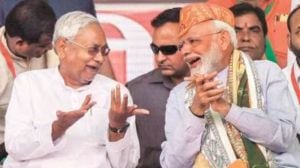Britain recruits 7,367 Indian nurses in 2003
In an effort to boost the functioning of the National Health Service, Britain recruited as many as 27,000 nurses from abroad last year with ...

In an effort to boost the functioning of the National Health Service, Britain recruited as many as 27,000 nurses from abroad last year with the second largest contingent of 7,367 coming from India. According to official figures, the Philippines provided the largest number of nurses — 8,749 — and South Africa with 4,422 came third.
One in three doctors at the NHS is from India, according to Health Secretary John Reid who recently hailed the contribution of doctors of Indian origin to the NHS.
Home Office figures show that 44,443 healthcare staff from countries outside the EU were issued with work permits last year, a 27-fold increase from 1993.
They fill every role in the health service from doctors and nurses to pharmacists, radiographers and occupational therapists. They go where British professionals are reluctant to work — traffic-choked inner cities and grimy housing estates — and they perform the essential caring tasks that their British counterparts are reluctant to take on. The efforts of these overseas staff counter the charge that immigration is imposing an unacceptable burden on Britain’s most valued institutions.
The British Medical Association has said that foreign health workers were the lifeblood of the NHS. ‘‘These overseas medics have a vital role to play. It takes 10 years to train a GP and 15 years to train a consultant, so even though the government is pouring money into recruitment now the effects will not be seen for many years,’’ a spokeswoman said.
The majority of the foreign staff is recruited by local NHS organisations. But many are brought in by private recruitment agencies aiming to supply locums to the health service.
There have been charges that Britain is stripping the developing world of its skilled staff. Ministers banned recruitment from the hardest-hit countries in 2001 but struck deals with others, including the Philippines and India, which have a surfeit of staff. — (PTI)



- 01
- 02
- 03
- 04
- 05




























